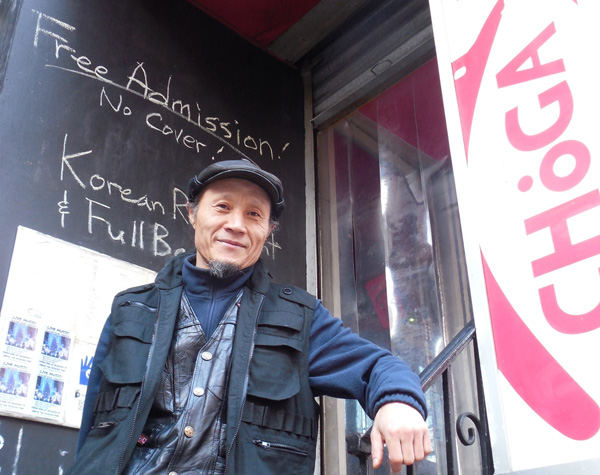
BY GERARD FLYNN | Long, long before Jack Kerouac ever stepped into one of its dive bars, Greenwich Village was synonymous the world over with literary and musical greatness. That was then. However, today, along Bleecker St., skyrocketing rents are giving a whole new meaning to the ’60s slogan “out of sight,” as chain stores and banks are supplanting the strip’s famed live music scene and making it virtually impossible for small-business owners to survive.
Choga, a Korean bar and restaurant located next door to the aptly named Bitter End on Bleecker St., is one of the remaining live music haunts around the Village, but will be closing by the end of this month. After more than 20 years in business, the owners were notified by their landlord that their lease would not be renewed.
Over the decades, the venue has gone through many incarnations. In the 1960s it was called the Tin Angel. Memoirs about rock legend Jimi Hendrix mentioned the place, in passing, as a spot where the guitar great would sit quietly with friends, drinking shots and writing songs on napkins.
One of the Choga’s partners, Jinho Jang, told The Villager that while he was sorry to go, there was little he could do.
“A lot of businesses are struggling, especially live music places,” he said.
While an upscale real-estate broker around the corner from the place told The Villager that the neighborhood was “booming,” Jang credits the celebrated music culture’s demise to a “a bad economy, and higher rents. These are the two big things,” he said.
He’s not the only one unhappy about the neighborhood’s rapid transformation.
“Performers have been complaining about the banks,” he said. “They don’t have to worry about the rent. Landlords can raise their rent — small businesses can’t survive.”
As he sat perched at the bar, Jang pointed to the new floor and sound system he installed two years ago and which now must go.
“It’s not an investment. It just happened,” he said of the improvements that cost him a hefty $30,000. “I just love live music.”
He then walked downstairs, leading a reporter on a short, nostalgic tour next door to what was left of the old neighborhood and to The Bitter End, New York’s oldest rock club. There he pointed to a black-and-white photograph of the venue, showing the canopy of the Tin Angel in the background.
Of the performers, he said, “They don’t want it to go. They feel more sorry than I do. They loved it. I revived the live music scene here.”
Jang isn’t sure what the landlord will do with the 2,000-square-foot space. But he’s somewhat puzzled at the closures of so many area venues, he said, since they often end up being shuttered for years. Or, he noted, pointing to a space across the street, they might open for a few months before abruptly closing again.
Jang doesn’t fault his landlord, whom he declined to name, for deciding not to renew his lease, since Choga struggled like so many others to pay the rent on time.
He said that Terra Blues, which is also on the block, is the only local live blues venue left. Yet, as more chain stores and banks come in, he’s hearing from other businesses that, like Choga, Terra Blues is “struggling to make ends meet.”
While Jang said he sees himself continuing in the music business, he needs some relaxing time. He will continue, though, to work sending American musicians to his native Korea.
“I have been doing this for more than a quarter of a century,” he said, “so I need a break.”





































